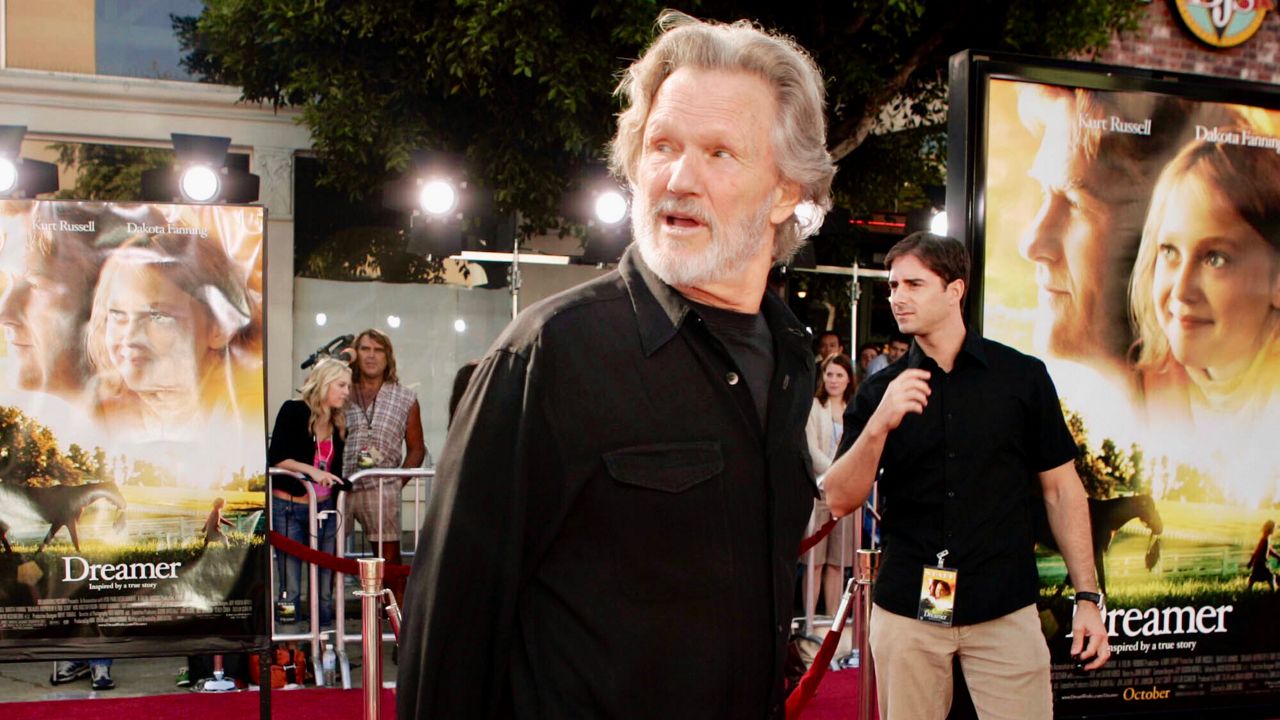LOS ANGELES — Kris Kristofferson, a Rhodes scholar with a deft writing style and rough charisma who became a country music superstar and A-list Hollywood actor, has died.
Kristofferson died at his home in Maui, Hawaii on Saturday, family spokeswoman Ebie McFarland said in an email. He was 88.
McFarland said Kristofferson died peacefully, surrounded by his family. No cause was given. He was 88.
Starting in the late 1960s, the Brownsville, Texas native wrote such classics standards as “Sunday Mornin' Comin' Down,” “Help Me Make it Through the Night,” "For the Good Times" and "Me and Bobby McGee." Kristofferson was a singer himself, but many of his songs were best known as performed by others, whether Ray Price crooning “For the Good Times” or Janis Joplin belting out “Me and Bobby McGee.”
Kristofferson, who could recite William Blake from memory, wove intricate folk music lyrics about loneliness and tender romance into popular country music. With his long hair and bell-bottomed slacks and counterculture songs influenced by Bob Dylan, he represented a new breed of country songwriters along with such peers as Willie Nelson, John Prine and Tom T. Hall.
"There's no better songwriter alive than Kris Kristofferson," Nelson said during a November 2009 award ceremony for Kristofferson held by BMI. "Everything he writes is a standard and we're all just going to have to live with that."
As an actor, he played the leading man opposite Barbara Streisand and Ellen Burstyn, but also had a fondness for shoot-out Westerns and cowboy dramas.
He was a Golden Gloves boxer and football player in college, received a master’s degree in English from Merton College at the University of Oxford in England and turned down an appointment to teach at the U.S. Military Academy at West Point, New York, to pursue songwriting in Nashville. Hoping to break into the industry, he worked as a part-time janitor at Columbia Records’ Music Row studio in 1966 when Dylan recorded tracks for the seminal “Blonde on Blonde” double album.
At times, the legend of Kristofferson was larger than real life. Cash liked to tell a mostly exaggerated story of how Kristofferson, a former U.S. Army pilot, landed a helicopter on Cash’s lawn to give him a tape of “Sunday Mornin’ Comin’ Down” with a beer in one hand. Over the years in interviews, Kristofferson said with all respect to Cash, while he did land a helicopter at Cash’s house, the Man in Black wasn’t even home at the time, the demo tape was a song that no one ever actually cut and he certainly couldn’t fly a helicopter holding a beer.
In a 2006 interview with The Associated Press, he said he might not have had a career without Cash.
“Shaking his hand when I was still in the Army backstage at the Grand Ole Opry was the moment I’d decided I’d come back,” Kristofferson said. “It was electric. He kind of took me under his wing before he cut any of my songs. He cut my first record that was record of the year. He put me on stage the first time.”
One of his most recorded songs, “Me and Bobby McGee,” was written based on a recommendation from Monument Records founder Fred Foster. Foster had a song title in his head called “Me and Bobby McKee,” named after a female secretary in his building. Kristofferson said in an interview in the magazine, “Performing Songwriter,” that he was inspired to write the lyrics about a man and woman on the road together after watching the Frederico Fellini film, “La Strada.”
Joplin, who had a close relationship with Kristofferson, changed the lyrics to make Bobby McGee a man and cut her version just days before she died in 1970 from a drug overdose. The recording became a posthumous No. 1 hit for Joplin.
Hits that Kristofferson recorded include “Why Me,” “Loving Her Was Easier (Than Anything I’ll Ever Do),” “Watch Closely Now,” “Desperados Waiting for a Train,” “A Song I’d Like to Sing” and “Jesus Was a Capricorn.”
In 1973, he married fellow songwriter Rita Coolidge and together they had a successful duet career that earned them two Grammy awards. They divorced in 1980.



